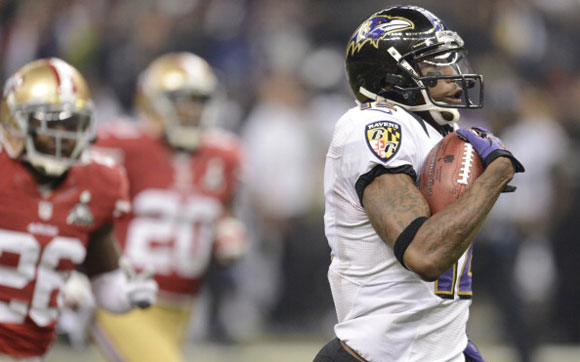Super Bowl XLVII: World records tumble as Baltimore Ravens beat San Francisco 49ers

Mike Janela reports as the Ravens hold their nerve to beat the 49ers 34-31 in a captivating game at the Superdome in New Orleans.
As expected, Sunday night's Super Bowl brought the same grandeur, spectacle, and action we've come to anticipate each year from one of the world's biggest sporting events. It also brought some unexpected surprises, including a 34-minute power outage and subsequent thrilling finish.
In the end, this season's edition saw the Baltimore Ravens hold off a furious but ultimately futile comeback attempt by the San Francisco 49ers to win the franchise's second-ever title, 34-31.
But while the Ravens celebrated long into the night and started planning trips to Disney World, we here at Guinness World Records were of course on the lookout for any record-breaking achievements throughout the game. And, perhaps also as expected, Super Bowl XLVII delivered that, too.
We start with the focal point of the Ravens offense: quarterback Joe Flacco. Flacco rode a three-touchdown performance to Super Bowl MVP honors, capping a flawless postseason for the QB in which he didn't commit a single turnover en route to tying an NFL playoff record for the most passing touchdowns in a single postseason with 11. It matches Joe Montana and Kurt Warner for the most all-time.
While Flacco led the team with his performance, there's no doubt Baltimore's inspirational leader was legendary linebacker Ray Lewis, who was the first player ever drafted in Ravens history in 1996. Lewis, who announced prior to the playoffs that he would retire after the season, won his second-ever Super Bowl, following up Baltimore's victory in Super Bowl XXXV in January 2001. The 12 years between victories is the longest time between Super Bowl wins for any player in NFL history.
Two more records helped the Ravens to victory. First, perhaps the game's most memorable play made history: Jacoby Jones' pivotal kickoff return for a touchdown to begin the second half with a touchdown for Baltimore tied the record for the longest-ever play in the NFL, canvassing 108 yards, good enough to stand alone for the longest play in Super Bowl history. And longtime Ravens safety Ed Reed notched an interception in the second quarter, tying the mark of most career postseason interceptions with nine.
Even in a losing effort, the 49ers broke some records of their own, led by quarterback Colin Kaepernick. His legs helped him break the all-time records for most rushing yards by a quarterback in a single postseason with 264 as well as galloping for the longest rushing touchdown by a quarterback in Super Bowl history, a 15-yard scamper in the fourth quarter.
And even away from the on-field action, the game itself set some records just by happening. It helped New Orleans tie Miami for the city to host the Super Bowl most often, as this was the 10 th incarnation to occur in The Big Easy. The Mercedes-Benz Superdome also extended its record for the most Super Bowls hosted by a single venue with 7.
Let's not forget about the television broadcast, either. Not only were the advertisements that airedthe costliest TV ads everwith a 30-second price tag of $4 million, but as the Super Bowl continues to grow bigger each year, it would be no surprise if the eventual announcement of the game's TV ratings usurp the record for the most-watched program in American television history. Interestingly, the Super Bowl has broken this record each of the last three years.
Sadly, talking about records set in a Super Bowl means that (American) football season is now over. But the celebrations will go on in Baltimore, as will the consolations in San Francisco. And for the 30 other NFL cities and those of us here at GWR headquarters? The countdown to next season is already on.


